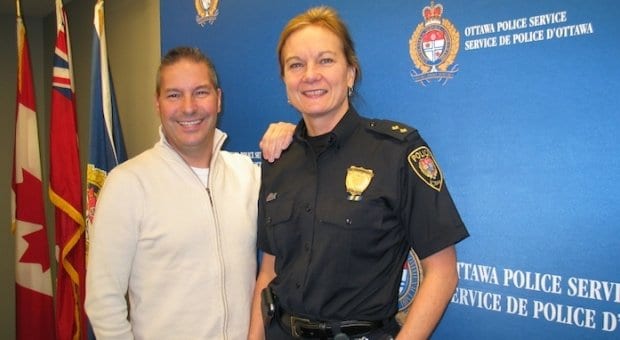It’s not a love-in, but the co-chairs of the Ottawa Police Service’s LGBT liaison committee are proud of what the group’s accomplished in the past 22 years.
The Ontario Association of Chiefs of Police recently introduced its “Best Practices in Policing and LGBTQ Communities” document, covering off issues from using equitable language, to providing inclusive workplaces for queer police personnel, to developing and maintaining a relationship between police services and LGBT communities.
While establishing a liaison committee between police and the queer community is a new idea for some jurisdictions in the province, Ottawa has more than two decades of experience in working to improve the traditionally problematic relationship between police and the queer community.
“It’s important to let [other jurisdictions] know that police and the community can get along, and they can sit at the table together and discuss issues — whether they agree or not — at least they’re at the table,” says Denis Schryburt, community co-chair of the LGBT liaison committee. “The liaison committee in the past has had their ups and downs between the police and the community, but we’ve always ended up at the table and discussed the issues, and I think that’s important.”
Inspector Joan McKenna, police co-chair of the LGBT liaison committee, agrees, saying Ottawa is in a good position to provide guidance to police departments looking to establish LGBT liaison committees and to help them when they need to resolve issues.
“I think we have a good foundation already, so we can probably provide more support to other [police] services,” McKenna says.
The “Best Practices in Policing and LGBTQ Communities” document is the first of its kind in Canada. Written after consultation with police personnel and LGBT community organizations across the province, the document will be updated in the future to reflect feedback from the community.
“It’s going to help restart the conversation between the police and the GLBT community and really promote what we’ve accomplished here in Ottawa to other jurisdictions across the province,” Schryburt says. “I think it’s an important document because it’s an evergreen document. It’s not like many of the other publications we’ve had in the past, where they’ve put out a publication, they’ve printed it, put it on a shelf, and it just stayed there and got really stale.”
Although Ottawa’s LGBT liaison committee is well established, it doesn’t mean there haven’t been bumps in the road, McKenna says, noting the controversial use of the words “sexual predator” in the Steven Boone case three years ago.
Police issued a press release revealing Boone’s name, photo and HIV status to media in 2010. When the release was forwarded to the OPS’s extranet site, which was available to LGBT liaison committee members, McKenna added the heading “sexual predator” in reference to Boone.
“I obviously had more knowledge, intimate knowledge, of the file, and when I read the documents that’s what I gleaned,” she says. “That’s my policing background as to what I interpreted in the file . . . [Being a sexual predator] is what he was doing. He was preying on young men.”
The experience showed there’s sometimes a disconnect between terms used in policing and what is considered acceptable terminology in the queer community, McKenna says.
Issues around disclosure and HIV criminalization are already contentious in the queer community, and those who attended LGBT liaison committee meetings during the Boone case saw not only a rift between police and the queer community, but also rifts among queer community members.
“I know I personally learned a lot. So did the [Ottawa Police] Service, but again we fostered a dialogue through some issues that arose through some criminal charges that were laid, and we moved forward,” McKenna says.
From police participation at queer events — including Chief Charles Bordeleau’s marching in Capital Pride — to special events like May’s information exchange on hate crimes, the LGBT liaison committee’s emphasis on respectful dialogue and community engagement has created an important bridge between police and the queer community, Schryburt says.
Still, he’s aware of the criticism from some members of Ottawa’s queer community who say only pro-police people join the liaison committee — a charge he rejects.
“What we have here is not a love-in,” he says. “It’s not a glee club or anything. This is an area where if you do have an issue with police or the committee or the community, this is the place to bring it. If you have any grievances or challenges that you’ve had with either police or the community, this is the place to have it.”
As community co-chair, one of Schryburt’s goals is to recruit more queer youth to the committee. On Nov 23, there will be a round table for queer youth at Ottawa City Hall aimed at learning why more youth don’t join the committee and discussing ways to reach out to them in the new year.
The LGBT liaison committee’s regular meetings are at OPS headquarters, 474 Elgin St, on the third Monday of the month at 5:35pm.


 Why you can trust Xtra
Why you can trust Xtra


